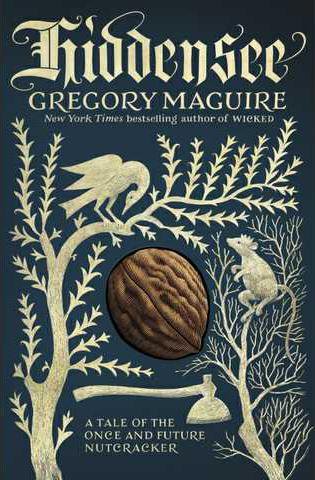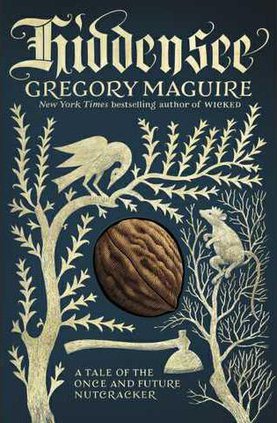"THE NOEL DIARY," by Richard Paul Evans, Simon & Schuster, 304 pages (f) (age 16 and up)
Over 20 years have passed since Richard Paul Evans released The Christmas Box but the "King of Christmas Fiction" proves hes still got it with his latest release, The Noel Diary. Evans knows something about what life is like as a best-selling romance author, which makes the books protagonist, renowned author Jacob Churcher, believable. In the end, it is Evans masterful storytelling that captures the readers attention as Churcher returns to his hometown in the wake of his mentally ill mothers passing, 20 years after she kicked him out as a 16-year-old. In his boyhood home, Churcher discovers his past, a new love and the mystery surrounding a woman who has long haunted his dreams. While the story is, in many ways, predictable, there are surprising twists and turns throughout. And, in true Evans form, amidst an otherwise fluffy and light read, he manages to teach a powerful lesson about the importance of extending grace to others.
Content advisory: "The Noel Diary" is clean romance that contains no graphic sexuality, swearing or violence.
Morgan Jones
"CHRISTMAS: A Biography," by Judith Flanders, Thomas Dunne Books, 245 pages (nf) (age 16 and up)
For many of us, it seems Christmas wouldn't be quite the same without the decorations, movies, cards, parties, plays and parades. But where did all these Christmas traditions come from? If you want to know the back story of how these and other popular holiday celebrations came to be, "Christmas: A Biography" is the book for you. Written by historian Judith Flanders, the book expounds the origin of common holiday traditions including wrapping gifts, decorating Christmas trees and Santa Claus. Flanders provides an academic-style chronology of Christmas traditions and how they have changed over time, guided by symbols indicating the origins of things like holiday food, gift-giving, music, dancing and religious rituals. "Christmas: A Biography" is loaded with fun and interesting historical facts and makes an interesting read for history lovers and holiday lovers alike.
Content advisory: "Christmas: A Biography" deals with mature themes, but nothing of a graphic nature.
Sarah Harris
"LAST CHRISTMAS IN PARIS: A Novel of World War I," by Hazel Gaynor and Heather Webb, William Morrow, 368 pages (f) (ages 16 and up)
Christmas love stories are nothing new. But Hazel Gaynor and Heather Webb found a way to put an innovative spin on a classic Christmas romance with their book Last Christmas in Paris. Told in a series of letters, readers follow the feelings of Tom Harding and Evie Elliot, two once-friends who have fallen for each other, despite the distance created by World War I. It is hard not to not fall right along with them and readers will suffer their anguish, joy and heartache that they experience through the story. The books ending is as tied up as any Christmas package, neatly wrapped and pinned by a bow, but that only adds to the charm of this classic Christmas story with a new twist.
Content advisory: "Last Christmas in Paris" includes the occasional swear word, descriptions of war and mentions of alcohol and drug abuse.
Herb Scribner
MESSIAH: The Composition and Afterlife of Handels Masterpiece, by Jonathan Keates, Basic Books, 130 pages (nf) (ages 16 and up)
Handels Messiah is a Christmas favorite in many parts of the world, but it didnt start out that way. Author Jonathan Keates illuminates the biography of this famous oratorio (dramatic text set to music), and explains why he describes its composition as an act of faith. Messiahs life story is one of humble beginnings, soaring successes, controversial adaptations, and eventual redemption, not unlike the scriptures from whence it came. Composed during a time of personal turmoil for its composer and the scientific revolution that had society questioning its collective faith, Keates explores the themes in Messiah that still resonate with audiences nearly 200 years after its birth. This book is geared toward lovers of classic music, but is not beyond the reach of casual listeners who enjoy a bit of musical history. Personal touches, such as the story of the scandalous English 18th-century singer Susannah Cibber, and photos of Handels smudgy original score add interest to the narrative. Messiahs charitable beginnings and its eventual success story provide context for the music and will have readers singing Hallelujah!
Content Advisory: Messiah: The Composition and Afterlife of Handels Masterpiece contains no objectionable content.
Janica Meiners
"HIDDENSEE: A Tale of the Once and Future Nutcracker," by Gregory Maguire, William Morrow, 304 pages (f) (ages 18 and up)
From best-selling author Gregory Maguire (Wicked") comes the new novel Hiddensee, an origin story of Clara's godfather Drosselmeier and his wooden Nutcracker from Tchaikovsky's famous ballet "The Nutcracker." More than just an origin story about a Christmas classic, however, Maguire offers a glimpse into a completely new and fantastical world where magic is real and anything is possible. Drosselmeiers story takes readers from his days as a young, impoverished boy through his struggles and pitfalls on his journey to becoming the mythic toymaker. By the end, he is something of a hero for his goddaughter creating the special nutcracker just for her and promoting a serious message of hope.
Content advisory: "Hiddensee" includes sexual content, descriptions of childbirth and death, as well as references to alcohol and drug use.
Herb Scribner
Over 20 years have passed since Richard Paul Evans released The Christmas Box but the "King of Christmas Fiction" proves hes still got it with his latest release, The Noel Diary. Evans knows something about what life is like as a best-selling romance author, which makes the books protagonist, renowned author Jacob Churcher, believable. In the end, it is Evans masterful storytelling that captures the readers attention as Churcher returns to his hometown in the wake of his mentally ill mothers passing, 20 years after she kicked him out as a 16-year-old. In his boyhood home, Churcher discovers his past, a new love and the mystery surrounding a woman who has long haunted his dreams. While the story is, in many ways, predictable, there are surprising twists and turns throughout. And, in true Evans form, amidst an otherwise fluffy and light read, he manages to teach a powerful lesson about the importance of extending grace to others.
Content advisory: "The Noel Diary" is clean romance that contains no graphic sexuality, swearing or violence.
Morgan Jones
"CHRISTMAS: A Biography," by Judith Flanders, Thomas Dunne Books, 245 pages (nf) (age 16 and up)
For many of us, it seems Christmas wouldn't be quite the same without the decorations, movies, cards, parties, plays and parades. But where did all these Christmas traditions come from? If you want to know the back story of how these and other popular holiday celebrations came to be, "Christmas: A Biography" is the book for you. Written by historian Judith Flanders, the book expounds the origin of common holiday traditions including wrapping gifts, decorating Christmas trees and Santa Claus. Flanders provides an academic-style chronology of Christmas traditions and how they have changed over time, guided by symbols indicating the origins of things like holiday food, gift-giving, music, dancing and religious rituals. "Christmas: A Biography" is loaded with fun and interesting historical facts and makes an interesting read for history lovers and holiday lovers alike.
Content advisory: "Christmas: A Biography" deals with mature themes, but nothing of a graphic nature.
Sarah Harris
"LAST CHRISTMAS IN PARIS: A Novel of World War I," by Hazel Gaynor and Heather Webb, William Morrow, 368 pages (f) (ages 16 and up)
Christmas love stories are nothing new. But Hazel Gaynor and Heather Webb found a way to put an innovative spin on a classic Christmas romance with their book Last Christmas in Paris. Told in a series of letters, readers follow the feelings of Tom Harding and Evie Elliot, two once-friends who have fallen for each other, despite the distance created by World War I. It is hard not to not fall right along with them and readers will suffer their anguish, joy and heartache that they experience through the story. The books ending is as tied up as any Christmas package, neatly wrapped and pinned by a bow, but that only adds to the charm of this classic Christmas story with a new twist.
Content advisory: "Last Christmas in Paris" includes the occasional swear word, descriptions of war and mentions of alcohol and drug abuse.
Herb Scribner
MESSIAH: The Composition and Afterlife of Handels Masterpiece, by Jonathan Keates, Basic Books, 130 pages (nf) (ages 16 and up)
Handels Messiah is a Christmas favorite in many parts of the world, but it didnt start out that way. Author Jonathan Keates illuminates the biography of this famous oratorio (dramatic text set to music), and explains why he describes its composition as an act of faith. Messiahs life story is one of humble beginnings, soaring successes, controversial adaptations, and eventual redemption, not unlike the scriptures from whence it came. Composed during a time of personal turmoil for its composer and the scientific revolution that had society questioning its collective faith, Keates explores the themes in Messiah that still resonate with audiences nearly 200 years after its birth. This book is geared toward lovers of classic music, but is not beyond the reach of casual listeners who enjoy a bit of musical history. Personal touches, such as the story of the scandalous English 18th-century singer Susannah Cibber, and photos of Handels smudgy original score add interest to the narrative. Messiahs charitable beginnings and its eventual success story provide context for the music and will have readers singing Hallelujah!
Content Advisory: Messiah: The Composition and Afterlife of Handels Masterpiece contains no objectionable content.
Janica Meiners
"HIDDENSEE: A Tale of the Once and Future Nutcracker," by Gregory Maguire, William Morrow, 304 pages (f) (ages 18 and up)
From best-selling author Gregory Maguire (Wicked") comes the new novel Hiddensee, an origin story of Clara's godfather Drosselmeier and his wooden Nutcracker from Tchaikovsky's famous ballet "The Nutcracker." More than just an origin story about a Christmas classic, however, Maguire offers a glimpse into a completely new and fantastical world where magic is real and anything is possible. Drosselmeiers story takes readers from his days as a young, impoverished boy through his struggles and pitfalls on his journey to becoming the mythic toymaker. By the end, he is something of a hero for his goddaughter creating the special nutcracker just for her and promoting a serious message of hope.
Content advisory: "Hiddensee" includes sexual content, descriptions of childbirth and death, as well as references to alcohol and drug use.
Herb Scribner



